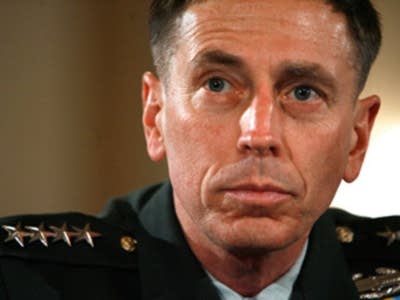House hearing on Iraq
Go Deeper.
Create an account or log in to save stories.
Like this?
Thanks for liking this story! We have added it to a list of your favorite stories.

(AP) Gen. David Petraeus faced lawmakers Monday with glittering stars and the weight of an unpopular war on his shoulders.
Much as Gen. William Westmoreland defended another divisive conflict with a steely-jawed optimism four decades ago, the Iraq war commander sat stoicly before his questioners and asked them to give escalation a chance. The first moments weren't without a discordant note indicative of the divisiveness in the air over Iraq war policy.
"Tell the truth, general," shouted protesters as the four-star general made his way into the crowded hearing room.
Petraeus did not respond, either to them or to the sole heckler who interrupted the session in its opening seconds before being taken out.
Turn Up Your Support
MPR News helps you turn down the noise and build shared understanding. Turn up your support for this public resource and keep trusted journalism accessible to all.
At the moment of highest anticipation - when Petraeus was finally asked to speak, after lengthy opening statements from lawmakers, his microphone failed. In the awkward minutes that followed in the ornate hearing room, two more protesters made a commotion and were removed from the room.
The hearing recessed because of the technical glitch. At one poimt, speakers screeched like feedback at a rock concert.
As lawmakers delivered opening statements, Ryan Crocker, the ambassador to Iraq, sat with his hands folded in from of him and tapped his thumbs together in a sign of impatience. Petraeus looked down from time to time at his own remarks, and seemed to be practicing his lines, lips moving while he silently mouthed the words.
Generals command keen attention on Capitol Hill - even Westmoreland, speaking to a joint session of Congress at the height of the tempest over Vietnam, was interrupted 19 times for applause in a half-hour speech in 1967.
Petraeus testified in the shadow of a parade of generals called to account for wars won and lost.
Congress has a rich and checkered tradition of dealing with generals. Some of the most inept civilian advice on the conduct of warfare ever came from a committee that thought it knew better than Abraham Lincoln's commanders how to run the Civil War.
History has judged that, at times, the civilians did know better.
Another committee cut Gen. Douglas MacArthur down to size in 1951, deftly exposing the flaws that had led President Harry Truman to remove him as Korean war commander for insubordination. A hero to millions when Truman sacked him, MacArthur left the hearing room closer to plainly human.
Chalk one up for lawmakers, who are inevitably second-guessers in a time of war.
"There's a lot of people who are armchair generals who reside here in the air-conditioned comfort of Capitol Hill," observed Arizona Sen. John McCain, a Republican presidential hopeful and stout defender of the 2007 troop increase.
In the Civil War, the hawkish Joint Committee on the Conduct of the War pressed outdated tactics and demands for quicker, tougher action on military officers schooled in doctrine and seasoned in the battlefield. There was no air conditioning, but plenty of hot air, in the view of historian Bruce Tap, author of "Over Lincoln's Shoulder."
"They were ideologically moral men who advocated just and ethical causes, but they were also narrow-minded partisans, blinded by their own sense of importance and self-righteousness," he wrote in the Journal of the Abraham Lincoln Association in 2002.
"Most of the time, they consumed time and resources with little practical influence on the Northern war effort."
Generals are more likely to be venerated on Capitol Hill than roasted, even when wars are going badly. It's the commander in chief who takes the heat.
"There's not much political pay dirt in attacking generals," said John Mueller, a professor of political science at Ohio State and an authority on war, the presidency and public opinion. "Anyway, it doesn't do any good. Except maybe for MacArthur, they do try to stay out of politics and they're generally pretty good at that."
But testifying has not always been a great career move.
Major Gen. George Armstrong Custer embarrassed his superiors when, in congressional testimony, he verified allegations that federal agents had taken money for Indian reservations. By some historical accounts, the resulting shortages on the reservations sent Indians back out to fight.
Custer's 1876 testimony cost him his command. He got it back in time to engage those Indians at Little Big Horn and die there with his men - no whistle-blower protections for him.
Less dramatic but unmistakable consequences befell Gen. Eric Shinseki, the Army chief of staff who upset his civilian bosses in 2003 when he testified that it might take several hundred thousand U.S. troops to control Iraq after the coming invasion.
His words were prophetic but he was out of the job within months. He left with the warning, "Beware a 12-division strategy for a 10-division army."
In 1967, President Lyndon Johnson attributed much of the anti-war sentiment to partisan objections to him and felt there was a positive story to be told about Vietnam.
Westmoreland stepped forward with his "light-at-the-end-of-the-tunnel talks" to members of Congress and the press, Mueller said. "Objectively, you could say that things were better."
But as it turned out, he added, "the tunnel was very long."





